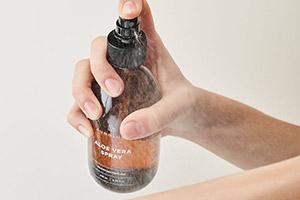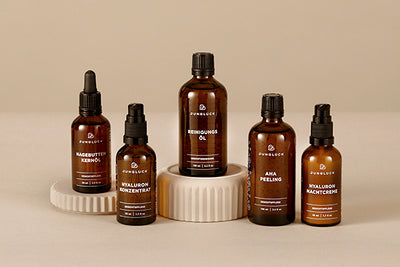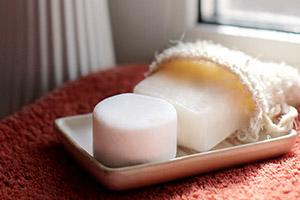Vegan cosmetics are very much in vogue. More and more people are turning towards a purely plant-based lifestyle - including vegan cosmetics. In this article, I would like to tell you more about what makes good vegan cosmetics and what role ethical and environmental aspects play. Enjoy reading!
1. Vegan cosmetics - the ethical aspect
2. Recognizing vegan cosmetics
3. Vegan cosmetics - are they generally better?
4. Vegan cosmetics vs. natural cosmetics
5. Living vegan - the future is plant-based
1. Vegan cosmetics - the ethical aspect
I still remember exactly the day I was "veganised". It was a balmy summer evening in Berlin and I was sitting outside a bar with a friend. I was 15 and had been a vegetarian since childhood. My friend explained to me the connections between the dairy industry, eggs and animal suffering and what impact my consumer behavior had on the environment, animals and ultimately on all people.
A thousand thoughts buzzed through my head. That cows only give milk when they have calves, that there can be slaughterhouse waste in cosmetic products and that the rainforest is being cleared to grow fodder crops for farm animals in huge monocultures.
It suddenly clicked. Everything is connected and is a huge cycle - and we are part of the system. Worldwide, dairy and meat companies play a driving role as a climate factor.
According to the German Federal Environment Agency, around 62 percent of total methane emissions in Germany are caused by agricultural livestock farming.
79 percent of nitrous oxide emissions in Germany are a result of nitrogen fertilization of agricultural soils.
2. Recognizing vegan cosmetics
An African proverb says "Many little people doing many little things in many little places can change the face of the world." Everyone can contribute to reducing CO2 emissions and animal suffering through their daily habits.
Another good reason for vegan cosmetics are some of the ingredients in conventional cosmetic products that hardly anyone would want to let touch their skin. "Hydrolyzed collagen, for example, is made from slaughterhouse waste. You don't feel like it? Go vegan in the bathroom!
Vegan cosmetics can be labelled with seals such as the "vegan flower" or the word "vegan". Because all of our products are vegan, you can shop through our entire range if you only want to use purely plant-based products on your skin.
What my 15-year-old self would have given for that! I still remember having to go shopping with a vegan cookbook from an esoteric shop under my arm at the time, as it contained an extensive list of non-vegan ingredients. Fortunately, those days are over.
3. Vegan cosmetics - are they generally better?
Supermarkets and drugstores now resemble - in contrast to the past - a land of milk and honey for vegans. The veggie market is booming and I love it! But precisely because veganism has become a trend, it is worth taking a close look to avoid falling into the "greenwashing" trap. Unfortunately, vegan cosmetics are not per se environmentally friendly, animal-free or particularly gentle on the skin. Let's think about that:
Chemical ingredients, parabens, or silicones are vegan, but do you really want them on your skin?
Raw materials associated with considerable damage to the environment, such as mineral oil, are also vegan. But are they still appropriate for the time being?
Animal testing for cosmetic products has been banned in the EU since 2013. Just because it says "not tested on animals" on the product, this does not mean that no animal testing has been done for individual chemical ingredients.
That's why it's always worth taking a closer look!. For many conventional ingredients, there are already gentle and environmentally friendly alternatives, for example sugar surfactants, which we use for our shampoo and hand soap.
4. Vegan cosmetics vs. natural cosmetics
Sometimes you can't differentiate between all these green alternatives. But is everything really as natural as those products suggest at first glance? Or is "greenwashing" being practiced here as well?
Natural cosmetics is not a protected term. Thus, it is not clearly defined what constitutes natural cosmetics. Labels given by various associations serve as a guide. The criteria for granting labels depend on the respective association.
Some have very strict guidelines, others fewer. Where it says natural cosmetics on the label, it does not necessarily mean a purely natural or even purely plant-based product. It's worth taking a look at the product's details.
Our company philosophy is based on three pillars: honesty, sustainability and responsibility:
100% vegan cosmetics
regional production
as little waste as possible
As a climate-neutral company, JUNGLÜCK supports UN goals for sustainable development.
5. Living vegan - the future is plant-based
When I look at the development of the last few years, I have great hope that we will rock history after all. Although I am less dogmatic and strict today than I was as a teenager with world-saving ambitions, veganism is probably more relevant than ever in the face of climate change.
The more people rely on vegan products from sustainable production, the better our future looks in terms of global warming. Numerous studies have shown that a vegan lifestyle has a significantly lower impact on the climate.
It is not about one person saving the world. It's about the many small steps we take together so that our beautiful planet can recover and continue to provide a safe home for us, future generations and biodiversity.
If we can enjoy noticeable effects at the same time, because we only allow gentle and truly natural vegan cosmetics to touch our skin, that's even better!
https://www.umweltbundesamt.de/daten/land-forstwirtschaft/beitrag-der-landwirtschaft-zu-den-treibhausgas#treibhausgas-emissionen-aus-der-landwirtschaft
https://www.ipcc.ch/srccl/
https://www.nature.com/articles/d41586-019-02409-7
https://www.iatp.org/emissions-impossible





Leave a comment